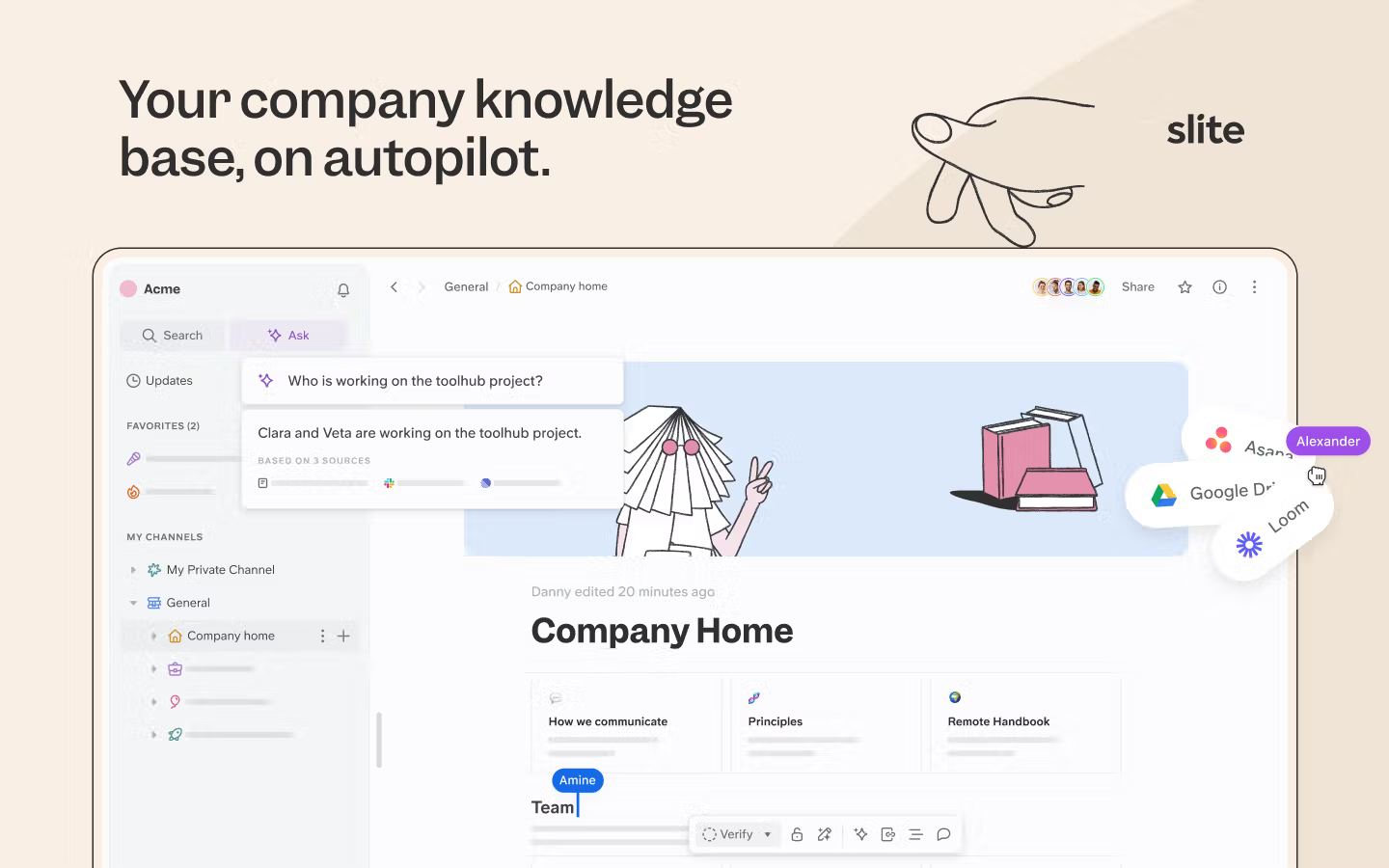Information overload – an emerging norm at workplaces – is making employees care less about tracking important information and leaves them with little energy to focus on their actual jobs.
And the numbers don’t lie. A survey shows that 35% of Americans feel as though the ‘information burden’ is too high – endless meetings, conflicting internal communication, and time wasted gathering knowledge scattered across different tools.
To combat this negative trend, businesses are turning to a new role: the knowledge manager.
What is a Knowledge Manager?
A Knowledge Manager is a professional responsible for organizing, sharing, and preserving a company’s collective intelligence. Put simply, they make it easier to track and share important information which, in turn, makes employees more productive and lets managers make faster and better decisions.
It’s highly likely that you or someone else at your company has worn the knowledge management hat at least once (and maybe without realizing it!).
Ever granted new employees viewing permission to the company’s Google docs as part of the onboarding process? That’s knowledge management.
Invited a senior HR personnel in the past to inspect and possibly update workplace behavior guidelines? That’s knowledge management too.
DIY knowledge management aside, what skills does an actual knowledge manager have?
Well, they’re defined by many traits but are essentially people who, above all else, excel in these two domains:
1. Technical Know How: Many knowledge managers we’ve spoken to started their careers as technical writers, then progressively got better at organizing information (i.e. info architecture), and finally developed the technical know-how to manage and leverage knowledge bases. They’re proficient with relevant software tools, databases, and ideally, content management systems
2. Soft Skills: Beyond technical skills, a knowledge manager has strong interpersonal and communication skills both of which are needed to create a positive work environment. They’re able to build relationships, collaborate, are adaptable, and possess excellent organizational skills.
Excellent! You now know the responsibilities of a knowledge manager and what makes them so valuable. This brings up an important question: how to decide when and if to hire a KM?
When’s the Right Time to Hire a Knowledge Manager?
The ‘right’ time to hire a knowledge manager is when poor information architecture causes employees to ask repetitive questions. Questions like “Where can I find the latest version of the company's policies?”, “How do I share my new process or discovery with the team?”, or “Who is responsible for updating our company's knowledge base?”.
Sometimes, managers try to solve this problem by adopting all-in-one enterprise level tools that inadvertently scatters knowledge more than it already is and further steepens the learning curve.
In both scenarios, a KM can step in and consolidate unorganized data into a centralized information hub—and that’s just one benefit of hiring a KM.
Let’s explore other big benefits knowledge managers bring to the table.
The Benefits of Having a Knowledge Manager
You read earlier that the hallmark of a great knowledge manager is a combination of technical know how and soft skills. When both of these come together, a KM is able to:
- Organize and Facilitate Easy Access to Information: Knowledge managers can create processes and systems such as a central hub for storing and accessing knowledge. They also ensure that employees—irrespective of experience and designation—can access these systems to find the answers they need.
- Improve Team Collaboration: Once a company’s knowledge base becomes accessible by less tech savvy employees, team members can communicate and collaborate on projects that require shared understanding. As collaboration improves, the organization starts to see less redundant and duplicate work.
- Smoothen Out the Onboarding Process: With relevant information and learning resources readily available, the learning curve flattens out and new hires can hit the ground running. Effective onboarding practices have shown to help employees become more confident and boost engagement rates anywhere from 20 to 40%!
- Preserve Institutional Knowledge: Without a knowledge manager or management systems in place, each time a key employee leaves, institutional knowledge or processes used to preserve such knowledge depart with them. A knowledge manager knows how to document and preserve valuable expertise so the company doesn't have to start from scratch.
- Support Continuous Learning: The role of KMs isn’t just to sort and organize company documents; it also focuses on fostering a culture of innovation by encouraging employees to discuss and share their knowledge. The result is a supportive environment where SMEs share their insights, junior level employees learn from experienced team members, and everyone levels up together.
Given how impactful a knowledge manager can be to any organization, does it make sense to not hire one immediately? Yes, in quite a few cases, you can delay bringing a KM on board.
Is It Okay to Not Hire a Knowledge Manager?
It’s okay to delay hiring a KM (but not knowledge management itself) under these circumstances:
- You Operate in Small, Close-Knit Teams: Generally speaking, companies with less than 300-500 employees can make due without a knowledge manager provided there’s a well-established knowledge base and management practices and/or tools in place.
- Sharing Ideas and Information is Part of Company Culture: There’s an active knowledge sharing cultureeven without a KM at the helm, an example of which is when team members routinely share ideas and best practices via channels like Slack, Loom, and emails.
- There are Budget Constraints: Finances don’t allow you to hire a dedicated KM.
While we’re on the topic of finances, how much can you expect to pay a qualified knowledge manager?
The Cost of Hiring a Knowledge Manager in 2024
The salary range for knowledge managers depends on factors such as location, years of experience, and industry. The table below shows the average salary for knowledge managers in 2024 based on location:
Region
Average Salary Range

How Knowledge Managers Support Different Teams
The following are a few ways KMs support different business and operational teams.
A. Human Resources
A knowledge manager ensures HR teams remain compliant with industry regulations, particularly important in industries like Finance and Healthcare.
B. Project Management
Knowledge managers standardize documentation practices and create company wikis to catalog past projects. What’s more, they assist project managers with analyzing previous projects to address potential challenges. As time goes on, this accumulated knowledge streamlines workflows and drives project success!
C. Customer Support
Knowledge Managers develop a comprehensive knowledge base that includes troubleshooting articles, video tutorials, and chatbots to assist customer support agents in resolving common customer issues quickly, ultimately improving customer satisfaction rates.
D. Product Development
Since KMs are data analysts at heart, they’re able to provide UX/UI and competitor research insights to the product development team that enables them to create products and services that the end user really wants.
Alternatives to Hiring a Knowledge Manager
You’re serious about knowledge management, but hiring a dedicated KM isn’t an option right now. Are there alternatives? Yes. As more and more companies realize the importance of knowledge management, they’re leveraging cloud-based or proprietary software to reap the benefits of KM without hiring a dedicated manager—at least, that’s what the theory says.
As a globally distributed team ourselves, we've learned firsthand that the right knowledge management tool makes all the difference. Slite's core features are built specifically for this purpose - from powerful search capabilities that surface relevant information instantly, to customizable templates that standardize documentation across teams, to nested pages that keep related information organized and accessible. Our wiki structure allows teams to build a living, breathing knowledge base that evolves with their organization.
The key is choosing a tool that makes knowledge sharing feel natural and effortless. When your knowledge management solution fits seamlessly into your team's workflow, you'll find people actually want to document and share what they know.
Conclusion
Do you find yourself in meetings that could've been emails? Well, those emails could have been docs in your Knowledge Base and a knowledge manager does exactly that. Their job description might mention writing and doc management - but their impact is:
Fewer meetings, fewer pointless email chains, and more deep work
This, in a nutshell, is what makes knowledge managers so valuable, irrespective of the industry they operate in.
Not to toot our own horn, but we’re really proud of what Slite has to offer. It’s a knowledge management solution that has helped thousands of users easily document, manage, and find knowledge over time. It doesn’t claim to be an all-in-one productivity tool—there are plenty of great options in the market for that.

But if knowledge management is your main concern, try giving Slite a try.

